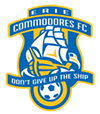JUNIORS
EC FC Mission
It is Erie Commodores mission to provide an open, inclusive club with the highest levels of governance, best coaching programs and lowest fees for Elite Pathways in Pennsylvania.
By having a professional board and an open structure we can encourage more participation in the Erie community and more support for the Game – from business and from all members of the soccer ecosystem.
EC FC Vision
- Ensure that all Erie Commodores youths with appropriate desire and abilities have access to elite Soccer pathways
- Operate successful senior teams, promoting and leveraging the status of Soccer to attract and retain significant sponsorship for EC FC which can help fund the development of the youth players.
- Maintain exceptional levels of professionalism and governance for the greater good of Soccer and facilitating the participation of all stakeholders at the Gold Coast
- Provide free community access to the game to introduce kids to the opportunities it can provide.
- EC FC seeks to become the major provider of players to state, high school, college and national programs
Club Structure
- Senior NPSL Mens and Womens teams representing the city
- Senior Competition teams playing in GLA competitions and regional tournaments
- Junior Competition teams playing in GLA competitions and regional tournaments
- Community programs across 10 different counties
- Camps and skills clinics for over 1000 kids
EC FC has a 3 year plan to deliver a comprehensive offering to the community:
EC FC Mini Ball: 4-6 years of age
An introduction to the sport of soccer for both kids and parents, with a focus on refining motor skills, introducing team work and educating parents on the rules of the game.
EC FC FootsSkills Programme: 6-9 years of age
An introduction to the technical aspects of the game with a focus on individual technical skill development. This is an in-house programme that allows for kids to develop in a professional environment
EC FC Development Programme: 10-12 years of age
For more advanced players who have the ability to develop to the next level. This group does qadvanced skills development and starts to learn playing in a team environment coached by licensed coaches.
EC FC Soccer Camps: 6-16 years of age
Week long school holiday camps that cater for kids of all skill levels. A fun filled week with introduction to indoor soccer, beach soccer, video sessions and mini-games.
Erie Commodores FC Development Stages
Performance Phase: Age 16-20
Players at this age have completed most of their physical and mental development. All components of training can be combined and organized with the purpose of developing the highest potential of the player. The strength of the muscles helps the player to react faster to tactical situations. This stage is crucial for combining all the components of soccer in order to increase the players’ soccer knowledge.
Game Training Phase: Age 113-16
Players at this age develop a good understanding of the game. However, these players are limited by their physical size and the significant changes, which arise with puberty. safety should be the number one priority for the coach. The coach must be cautious to avoid overtraining and should focus more on tactical and technical elements of the game and less on physical aspects. Tactical training plays an important role at this age.
Skill Acquisition Phase: Age 9-13
At this stage, the structure (but not the content) of the training sessions will be similar to that of older players. The main component of the training session will be technical. It is sensible at this stage to develop technique and basic tactical understanding. Children’s Capacity to solve problems increased significantly. therefore players will begin working on basic and dynamic tactical scenarios. At this stage, players are prepubescent and have important physical limitations in terms of strength and endurance.
Discovery Phase: Age 5-9
At this age children do not have the same capacity as adults to analyze the environment. They explore and have an egocentric conception of the world. Children are still gathering the experience necessary to interact with their surroundings and with others. Also, empathy and the capacity to consider the thoughts and feelings of others is very low. In order to help children build their own experience, many exercises will be individual (e.g. each player will have a ball). The tactical components of the game will be reduced to small-sided games with basic explanations about space distribution. Training sessions will be treated more as physical education than specifically as soccer training.
